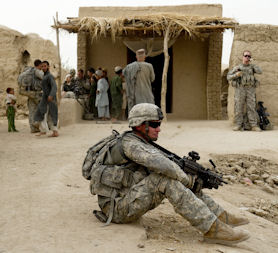 The Afghanistan war logs obtained by WikiLeaks revealed the existence of Task Force 373, a secret US unit assigned with eliminating Taliban leaders. Now SPIEGEL has learned that the German government provided names to the hit list used by the unit. At least one of the men is now dead
The Afghanistan war logs obtained by WikiLeaks revealed the existence of Task Force 373, a secret US unit assigned with eliminating Taliban leaders. Now SPIEGEL has learned that the German government provided names to the hit list used by the unit. At least one of the men is now dead
Thanks to the WikiLeaks revelations, war-weary Germany now knows that German officials added names to the JPEL at least 13 times.

 War Glance
War Glance It is, especially for the Afghan people, a war without end, and one to add to their history of other fruitless conflicts. An Independent on Sunday assessment, using records kept by Professor Marc Herold of the University of New Hampshire and the UN, puts the civilians killed as a direct result of the war since 2001 at 13,746.
It is, especially for the Afghan people, a war without end, and one to add to their history of other fruitless conflicts. An Independent on Sunday assessment, using records kept by Professor Marc Herold of the University of New Hampshire and the UN, puts the civilians killed as a direct result of the war since 2001 at 13,746. Australian weapons and equipment have repeatedly been discovered among Taliban stockpiles, raising fears that Afghan troops trained by Diggers have been pilfering military supplies.
Australian weapons and equipment have repeatedly been discovered among Taliban stockpiles, raising fears that Afghan troops trained by Diggers have been pilfering military supplies. A new global treaty banning cluster munitions has come into force. The Convention on Cluster Munitions bans the stockpiling, use and transfer of virtually all existing cluster bombs, and also provides for the clearing up of unexploded munitions.
A new global treaty banning cluster munitions has come into force. The Convention on Cluster Munitions bans the stockpiling, use and transfer of virtually all existing cluster bombs, and also provides for the clearing up of unexploded munitions. Three U.S. troops died in blasts in Afghanistan, bringing the death toll for July to at least 63 and surpassing the previous month's record as the deadliest for American forces in the nearly 9-year-old war.
Three U.S. troops died in blasts in Afghanistan, bringing the death toll for July to at least 63 and surpassing the previous month's record as the deadliest for American forces in the nearly 9-year-old war. The United States is currently the world biggest weapons supplier — holding 30 per cent of the market — but the Obama administration has begun modifying export control regulations in hopes of enlarging the U.S. market share, according to U.S. officials.
The United States is currently the world biggest weapons supplier — holding 30 per cent of the market — but the Obama administration has begun modifying export control regulations in hopes of enlarging the U.S. market share, according to U.S. officials.






























